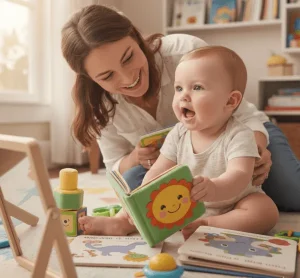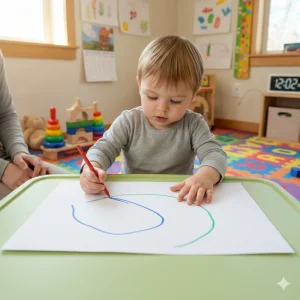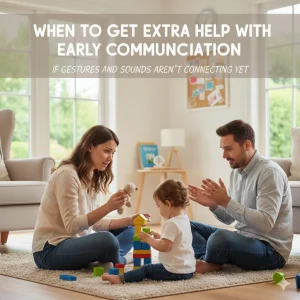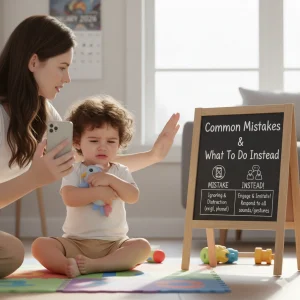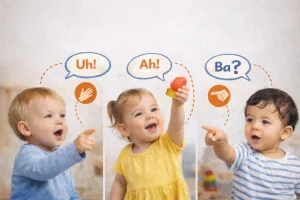Speech Delay in Toddlers: When It Could Be More Than Just a Delay
By Rajini D
Last Updated: July 14, 2025
Is your toddler not talking as much as you expected? You’re not alone — many parents wonder if their child is just a late talker or if it could be something more. While every child develops at their own pace, certain signs may point to a speech delay that needs attention.
This guide will help you understand the difference between normal speech development and delays that could signal a bigger issue, like autism, hearing loss, or other developmental challenges. The good news? Early intervention can make a big difference — and support is just a step away.
Free Speech Help for Kids
Concerned about speech delays? Book a free consultation with our expert speech therapist and get guidance tailored to your child’s needs.
What is a Speech Delay in Toddlers?
It’s natural to worry when your toddler isn’t talking as much as other children their age. But what exactly is a speech delay, and how do you know if your child has one?
A Simple Definition for Parents
A speech delay means your child is not developing speech skills at the expected rate for their age. They may use fewer words, struggle to put sounds together, or have trouble being understood when they talk.
This doesn’t always mean something serious is wrong — some children are just late bloomers. But it’s important to know when to watch more closely.
Speech Delay vs Language Delay: What’s the Difference?
These two terms sound similar but mean different things:
| Speech Delay | Language Delay |
|---|---|
| Trouble with saying words clearly | Trouble with understanding or using words |
| May know what they want to say, but can’t express it well | May not understand what’s being said or struggle to form ideas |
| Affects sounds and speaking | Affects communication and comprehension |
Sometimes a child can have both speech and language delays. That’s why it’s helpful to talk to a professional early.
How Speech Develops Normally (Speech Milestones by Age)
Here’s a quick look at common speech milestones for toddlers:
| Age | What Most Children Can Do |
|---|---|
| 12 months | Say 1–2 simple words like “mama” or “bye” |
| 18 months | Use around 10–20 words, copy simple sounds |
| 2 years | Say 50+ words, start combining 2 words (like “want milk”) |
| 3 years | Speak in short sentences, be understood by family most of the time |
When Should I Worry About a Speech Delay?
Every child grows at their own pace, especially when it comes to talking. But as a parent, it’s natural to wonder: Is my child just taking their time—or is there something more going on?
Knowing the difference between a minor speech delay and signs of a bigger concern can help you take the right steps early.
What Are the Common Signs of a Minor Speech Delay?
Sometimes, a child is simply a late talker, especially if they’re hitting other milestones like playing, understanding instructions, and showing interest in people.
Here are signs that your child may have a mild delay but not necessarily a serious issue:
- Has a limited vocabulary but gains new words slowly
- Uses gestures or sounds to communicate instead of words
- Understands what you say but struggles to speak back
- Tries to copy sounds or words but not clearly
- Is otherwise active, playful, and socially engaged
These children often catch up on their own or with a little speech support.
Is My Child a Late Talker or Is It Something More?
This is one of the most asked questions by parents.
Here’s a quick comparison to help:
| Just a Late Talker | Possible Red Flag |
|---|---|
| Uses gestures and facial expressions | Doesn’t point, wave, or use facial expressions |
| Tries to imitate sounds or words | Rarely makes sounds or tries to copy speech |
| Understands simple instructions | Doesn’t seem to understand or respond to name |
| Shows interest in people and play | Seems withdrawn or prefers being alone |
| Adds new words steadily (even if slowly) | No new words by 18–24 months |
Red Flags for Speech Delay That Need Attention
If your toddler shows any of the following, it’s best to consult a professional early:
- No babbling by 12 months
- No words by 16–18 months
- No 2-word combinations by age 2
- Hard to understand even for familiar adults by age 3
- No response to name or instructions
- Lack of eye contact or limited social interaction
- Regression: Your child had words but stopped using them
These could be signs of a developmental delay, hearing issue, or something more, such as autism.
Early Support Matters
If you’re unsure whether your child’s delay is something to worry about, a simple screening can help ease your mind or guide you to the right support.
At Wellness Hub, our expert team offers online speech assessments and early therapy sessions to help your child get the best start. Even a small delay can benefit from early attention.
When Should I Worry About a Speech Delay?
It’s easy to compare your toddler to others and start to worry — especially if your child isn’t talking as much or as clearly as their peers. So how do you know if it’s just a normal variation or a real concern?
Let’s break it down gently.
Common Signs of a Minor Speech Delay
Some children simply take a little longer to start talking. If your child understands what’s being said, plays normally, and is trying to communicate (even in their own way), that’s often a good sign.
Here are some mild speech delay signs that may not be serious:
- Limited vocabulary for their age but slowly adding new words
- Uses gestures like pointing, waving, or nodding instead of words
- Tries to copy sounds or say words but isn’t clear yet
- Understands daily routines and simple questions
- Is socially engaged and responsive to people
These children are often called “late talkers”, and many catch up naturally or with gentle support at home.
How Do I Know If My Child Is Just a Late Talker?
Here’s a quick table to help you figure it out:
| Late Talker | May Need Attention |
|---|---|
| Uses gestures like pointing or waving | Doesn’t use gestures by 12 months |
| Tries to imitate speech sounds | Rarely babbles or imitates sounds |
| Understands basic words like “no” or “come” | Doesn’t respond to their name or simple commands |
| Gains new words slowly but steadily | Still not saying any words by 18 months |
| Interacts socially and enjoys playtime | Shows limited interest in people or social play |
Remember: all kids grow differently. But if you feel something isn’t quite right, it’s okay to trust your instincts.
When Speech Delay Could Be a Red Flag
Here are some red flags for speech delay that may point to something more:
- No babbling by 12 months
- No single words by 16–18 months
- No two-word phrases by age 2
- Speech is unclear even to parents by age 3
- Little or no interest in interaction
- Loss of words or skills they had before
- Doesn’t respond when you speak or call their name
- Avoids eye contact or doesn’t engage in pretend play
These could be signs of developmental delays, hearing issues, or even early signs of autism.
You’re Not Alone — Support is Available
If you’re wondering when to worry about a speech delay, the safest answer is: when you’re unsure, check in early. A simple speech screening can ease your mind or help you get the right support.
At Wellness Hub, we offer:
- Online speech milestone check-ins
- Developmental screenings
- Early speech therapy programs led by qualified therapists
Speech Delay Signs of Something Serious
Sometimes, a speech delay is just a delay. But in other cases, it could be one of the first clues that something more is going on. Knowing what to look for can help you act early — and that can make all the difference.
Let’s explore the signs that may point to something bigger than just late talking.
Warning Signs That Could Mean More Than Just a Delay
If your child isn’t talking much and also shows challenges in how they interact or respond to the world around them, it may be time to take a closer look.
Here are a few serious speech delay signs that go beyond words:
- Doesn’t make eye contact
- Rarely uses gestures like pointing or waving
- Talks in a robotic or flat tone
- Doesn’t respond to their name
- Doesn’t try to copy words or sounds
- Avoids social play or seems disconnected
These may suggest a social communication delay — where a child struggles not just with speaking, but also with connecting to others through speech, body language, and expression.
Could It Be Autism, Hearing Loss, or a Developmental Delay?
Speech delay is often one of the earliest signs of autism. Children with autism may also show:
- Repetitive behaviors (e.g., flapping, lining up toys)
- Difficulty with pretend play
- Little interest in other children
- Strong reactions to sounds, lights, or textures
However, hearing issues can also cause speech delays — if a child can’t hear clearly, they may struggle to copy sounds and words. Similarly, broader developmental delays may affect how a child moves, plays, or understands the world. That’s why it’s important to look at the whole picture, not just speech.
Age-Specific Concerns to Watch For
Here’s a quick guide to help you spot concerns based on your child’s age:
| Age | Speech & Social Concerns to Watch For |
|---|---|
| By 18 months | No words, no pointing or waving, doesn’t respond to name |
| By 2 years | Fewer than 50 words, not combining 2 words, limited eye contact |
| By 3 years | Unclear speech, doesn’t ask for things, avoids interaction or pretend play |
If your child is showing multiple signs from this table, it may be time to speak to a professional.
What You Can Do
You don’t have to wait for things to get worse. Early screening and support can help your child build the skills they need — and give you peace of mind.
At Wellness Hub, we help parents:
- Understand if speech delay is part of something bigger
- Access autism screenings, hearing checks, and developmental assessments
- Begin early intervention through expert-led online therapy sessions
Speech Delay vs Autism – What’s the Link?
If your child has a speech delay, you might be wondering: Could it mean autism? Or is it just a speech issue?
It’s a common question for many parents. While not every child with a speech delay is autistic, speech delays can sometimes be an early sign of autism — especially when they happen alongside other developmental concerns.
Can Speech Delay Mean Autism?
Not always — but sometimes, yes.
A child with autism may struggle with more than just talking. They may also find it hard to connect socially, use gestures, or understand how communication works, even without words.
Here are a few signs that speech delay might be linked to autism:
- Doesn’t respond to name when called
- Shows little interest in others or avoids eye contact
- Doesn’t point to objects to show interest
- Has repetitive behaviors (hand flapping, spinning toys)
- Uses a robotic, flat, or unusual tone of voice
- Struggles with pretend play or back-and-forth interaction
If your child shows some of these signs along with a speech delay, it’s worth considering a developmental screening.
Speech Delay Alone vs Autism: Key Differences
| Speech Delay Alone | Speech Delay with Possible Autism |
|---|---|
| Good eye contact and social interest | Avoids eye contact, limited interest in people |
| Uses gestures to communicate | Rarely points, waves, or gestures |
| Understands language well | May not respond to instructions or simple questions |
| Interested in playing and exploring | Prefers routines or repetitive play |
| Tries to mimic or repeat sounds | Limited or unusual vocal patterns |
Every child is unique, so these signs are just guidelines — not a diagnosis.
When Should You Consider a Developmental Screening?
You don’t have to wait for a diagnosis to get help. If your child has:
- No words by 18 months
- No two-word phrases by age 2
- Struggles to connect or play with others
- Has unusual behaviors or reactions to sounds/light
… then it’s a good idea to schedule a developmental screening. These early checks can tell you if your child is just catching up or needs support.
What Causes Speech Delays in Children?
If your child isn’t talking as expected, it’s natural to wonder why. While every child develops at their own pace, there are several reasons a speech delay might happen. Some causes are simple and temporary, while others may need more attention.
Let’s look at the most common causes of speech delays — and why early support can make a big difference.
Hearing Problems Can Affect Speech
If a child can’t hear clearly, they may not learn how to speak clearly either.
Common hearing-related causes of speech delay:
- Frequent ear infections (fluid in the middle ear can block sound)
- Undiagnosed hearing loss
- Delayed response to sounds or voices
Tip: If your child doesn’t respond when you call their name, it could be a hearing issue — not just speech.
Oral-Motor and Speech Muscle Issues
Speech needs good coordination of the lips, tongue, jaw, and brain. If these parts aren’t working together smoothly, speech can be delayed.
Some examples:
- Trouble moving the mouth to make clear sounds
- Weak muscle tone or stiffness (oral-motor delay)
- Conditions like childhood apraxia of speech, where the brain struggles to plan mouth movements
Environment and Limited Interaction
Children learn language by listening, copying, and being spoken to. If they aren’t getting enough of that, it may slow their speech development.
Possible environmental causes include:
- Less parent-child conversation or reading
- Too much screen time without interaction
- Limited exposure to spoken language (e.g., in bilingual homes, both languages may develop slowly at first)
Speech grows best in rich, responsive environments.
Developmental and Neurological Conditions
Sometimes, speech delay is part of a broader developmental picture. Conditions that may cause or include speech delays:
| Condition | What to Watch For |
|---|---|
| Autism Spectrum Disorder | Delayed speech + social interaction challenges, repetitive behaviors |
| Global Developmental Delay | Slow progress in many areas like speech, motor skills, or thinking |
| Cerebral Palsy | Speech affected by motor control or muscle tone |
| Hearing or genetic disorders | May impact speech, language, or learning |
Each child is different — which is why personalized screening is so helpful.
Emotional and Behavioral Factors
Stress, anxiety, or trauma can also impact how a child talks. For example:
- Shy or withdrawn behavior
- Fear of being wrong or not understood
- Regressive behavior after big life changes (like a move, illness, or new sibling)
In these cases, gentle emotional support is just as important as speech practice.
Why Early Intervention Matters
The earlier you understand the cause, the better your chances of helping your child catch up. With the right support, most children with speech delays make great progress — especially if started before age 5.
At Wellness Hub, we:
- Identify the root causes of speech delay through expert screening
- Offer custom therapy plans tailored to your child’s needs
- Guide parents step-by-step with practical home strategies
How Early Intervention Helps Speech Development
If your toddler is showing signs of a speech delay, you might wonder: Should I wait and see, or take action now?
The answer is clear — early intervention for speech delays can make a big difference. The earlier your child gets support, the better their chances of catching up and communicating with confidence.
Why Acting Early Matters
Between ages 1 and 5, your child’s brain is developing rapidly. This is when they learn how to speak, understand language, and connect with the world. If there’s a delay, early support helps rewire those pathways faster.
Benefits of early intervention:
- Boosts speech and language skills before school starts
- Builds confidence in expressing needs and emotions
- Helps avoid frustration or behavioral issues from communication struggles
- Improves social interactions and play
Think of it as giving your child a head start — not just in speech, but in life.
Success Stories: Real Progress With Therapy
Many parents worry that a speech delay means lifelong struggles. But with the right help, children often make amazing progress — especially when therapy starts early.
One mom shared, “My 2-year-old went from saying just 3 words to speaking in short sentences within a few months of therapy. I only wish I had started sooner.”
Children who begin speech therapy early often:
- Learn to express themselves clearly
- Show better emotional regulation
- Connect more easily with peers
- Gain confidence in learning new skills
The Role of Parents in Early Speech Support
Therapists play a key role — but parents are the everyday heroes. Your daily routines, conversations, and encouragement shape your child’s progress.
Simple ways parents can support speech development:
- Talk during everyday activities (meals, bath time, play)
- Repeat and expand on what your child says
- Sing songs, read books, and name things around the house
- Give your child time to respond — don’t rush to finish sentences for them
When parents work together with a therapist, progress is faster and more lasting.
Start Early With Wellness Hub
At Wellness Hub, we help parents take the first step — without the wait.
Our expert team offers:
- Free speech consultations to understand your child’s needs
- Goal-based therapy plans, fully online and easy to follow
- Parent coaching and tools for at-home support
When to See a Speech Therapist for Your Toddler
Many parents ask: Is it too early for speech therapy? Should I wait and see?
The truth is — if you’re asking this question, it might be the right time to explore a consultation.
Seeing a speech therapist early doesn’t mean something is “wrong.” It means you’re taking a positive step to support your child’s communication and development.
How to Know If Speech Therapy Is Needed
Here are some signs that your toddler might benefit from seeing a speech-language therapist:
- Not talking as much as other kids their age
- Struggles to say words clearly or combine words into phrases
- Rarely uses gestures like pointing or waving
- Doesn’t respond to their name or simple instructions
- Frustrated when trying to express themselves
- Lost words they used to say (speech regression)
Even if your child understands language well but isn’t speaking clearly, it’s worth getting a professional opinion.
What to Expect During a Speech Assessment
A speech therapy assessment is simple, play-based, and child-friendly.
Here’s what usually happens:
- Parent interview – You’ll talk about your child’s development and your concerns.
- Play and observation – The therapist will interact with your child in a relaxed way, watching how they talk, listen, and respond.
- Skill check – The therapist might check for specific milestones like word use, clarity, and understanding.
- Feedback and plan – You’ll get a clear explanation of what’s going well and what could use support.
You don’t need to “prepare” your child — it feels more like play than a test!
What Does a Speech-Language Pathologist Do?
A speech-language pathologist (SLP) is trained to help children with:
- Speech clarity – Making sounds and words correctly
- Language development – Understanding and using words and sentences
- Social communication – Taking turns in conversation, using gestures, facial expressions
- Feeding and oral-motor skills (if needed)
They work closely with you to build a therapy plan that fits your child’s pace and personality.
How Wellness Hub Makes It Easy
At Wellness Hub, we make early speech support accessible and stress-free.
With us, you can:
- Book online consultations from home
- Get matched with expert, friendly speech therapists
- Receive goal-based plans and parent support tools
- Track your child’s progress through your own dashboard
Simple Tips to Support Speech at Home
You don’t have to be a speech therapist to help your child talk more. In fact, the best speech support starts at home — in everyday moments, routines, and play.
Here are some simple, fun, and natural ways to encourage your toddler’s speech every single day.
Talk to Your Child — All Day, Every Day
Children learn language by hearing it. The more you talk, the more they pick up.
Try this:
- Describe what you’re doing (“I’m washing the apples now.”)
- Name objects as you see them (“That’s a big red ball!”)
- Talk about your child’s interests (trains, animals, snacks — anything they love)
Even if your child isn’t talking back yet, they’re listening and learning.
Read Together Daily
Reading is one of the most powerful tools for speech development. It builds vocabulary, helps with sentence structure, and boosts listening skills.
Tips for book time:
- Choose short picture books with repetitive words or sounds
- Point to pictures and name them
- Let your child turn the pages and “read” in their own way
- Use funny voices and act things out to make it fun
Use Songs, Rhymes, and Music
Songs and rhymes are great for teaching rhythm, sounds, and new words.
Try:
- Action songs like “Wheels on the Bus”
- Rhymes with hand motions like “Itsy Bitsy Spider”
- Singing your daily routines (“Let’s brush our tee-ee-eth!”)
Don’t worry about singing perfectly — your child loves your voice.
Pause and Let Them Respond
Sometimes we talk so much, we forget to give kids a chance to speak.
Practice the “wait and watch” method:
- Ask a question, then pause (count to 5 silently)
- Wait for a sound, word, or even a look — and respond warmly
- Avoid jumping in too quickly to “fix” their speech
Make Everyday Moments a Speech Game
You don’t need flashcards or apps — real life is the best teacher.
Try these:
- During meals: Name foods, talk about colors and tastes
- Bath time: Sing songs, label body parts, describe water play
- Playtime: Follow your child’s lead and describe what they’re doing
- Outdoors: Talk about what you see — birds, cars, trees, sky
Conclusion
Speech delays in toddlers are common, but they shouldn’t be ignored. If your child isn’t talking as expected, it’s okay to feel concerned — and it’s always okay to ask for help. Early intervention for toddlers can improve speech, boost confidence, and support overall development. Trust your instincts. Acting early is one of the best things you can do. At Wellness Hub, we offer expert speech development support online — right from your home.
Frequently Asked Questions:
1. What is considered a speech delay in toddlers?
A speech delay means a child is not talking as much or as clearly as expected for their age. For example, not saying any words by 18 months or not using short sentences by age 2 can be signs of a delay.
2. When should I worry about my toddler’s speech delay?
You should consider help if your toddler isn’t saying words by 18 months, doesn’t follow simple instructions, or struggles to make eye contact or use gestures. These could be signs of something more serious.
3. Can a speech delay mean autism?
Yes, in some cases. If your child also avoids eye contact, doesn’t respond to their name, or shows repetitive behaviors, it could be linked to autism. It’s best to get a developmental screening to be sure.
4. What causes speech delays in children?
Speech delays can be caused by hearing problems, oral-motor issues, lack of interaction, developmental delays, or conditions like autism or apraxia. Each child is different, so it’s important to find the cause early.
5. Is my toddler just a late talker or is it a delay?
Late talkers usually understand well, use gestures, and try to copy sounds. If your child isn’t doing these things, it may be more than just a delay and might need therapy support.
6. How does early intervention help speech development?
Early intervention helps children learn to talk, express themselves, and connect better with others. The earlier support starts, the easier it is for the brain to build strong speech and language skills.
7. What does a speech therapist do for toddlers?
A speech-language therapist helps toddlers improve their speech sounds, use more words, understand language, and build social communication. Therapy is play-based and fun for kids.
8. Can a child with speech delay catch up without therapy?
Some children catch up on their own, but others need help. A therapist can guide your child and prevent the delay from affecting school and social life later.
9. What are red flags that speech delay could be something serious?
Red flags include no words by 18 months, no phrases by age 2, no eye contact, no gestures, or speech loss after progress. These signs may point to autism or developmental delay.
10. Where can I get help for my child’s speech delay?
You can start with a free consultation at Wellness Hub, where experts offer online speech therapy, developmental screenings, and parent guidance—all from the comfort of your home.
About the Author:
Rajini Darugupally
M.Sc., Speech-Language Pathologist (9+ years of experience)
Rajini is a passionate and dedicated Speech-Language Pathologist with over 9+ years of experience, specializing in both developmental speech and language disorders in children and rehabilitation in adults. Driven by a desire to empower each individual to find their voice, Rajini brings a wealth of experience and a warm, genuine approach to therapy. Currently, at Wellness Hub, she thrives in a team environment that values innovation, compassion, and achieving results for their clients.
Book your Free Consultation Today
Parent/Caregiver Info:
Client’s Details:
* Error Message
